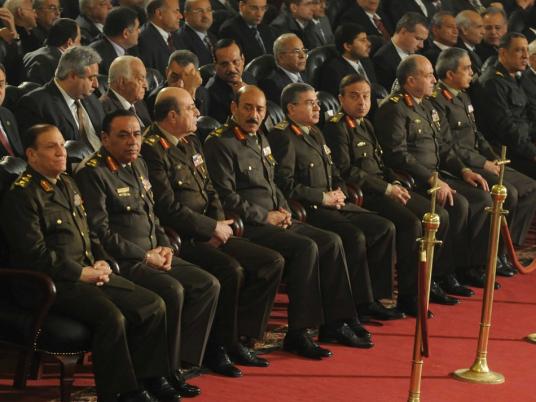
A number of politicians and analysts have agreed that the latest statement by the ruling Supreme Council of the Armed Forces demonstrated tension in its relations with the Muslim Brotherhood. They ruled out the argument that the current rift between the group and the SCAF is an attempt to distract critics of the formation of the constituent assembly.
They, however, differed on their view of the stance of liberal parties on the crisis.
Nabil Abdel Fattah, director of Al-Ahram Center for Political and Strategic Studies, said the statement reflected the political rivalry and clash of interests between the SCAF and the Brotherhood. He described the disagreement as a reversal from the common ground previously reached by the SCAF, the Brotherhood and Salafis.
“Recently, the Brotherhood seems to have lacked political wisdom, which was apparent in its handling of the cabinet removal and issues of the constituent assembly. The group is currently marked for political petulance, and is acting as if power is its main objective,” Abdel Fattah said.
Abdel Fattah illustrated that the last paragraph of the SCAF's statement is a clear reference to the crisis that had erupted in 1954 between former President Gamal Abdel Nasser and the Brotherhood, which resulted in sending group members to prison for long terms.
“But the Brotherhood's ability to read political history and recall the nature of its relationships with past regimes seems to be fading. The group even believes it spurred the 25 January revolution,” he added.
Abdel Fattah added that some social and liberal currents might support the SCAF against the Brotherhood.
Emad Gad, MP for the Free Egyptians Party said the SCAF, through the last paragraph of its statement, is attempting to remind the Brotherhood of the clash with Abdel Nasser. He explained that the current standoff signals a possible conflict, unless the Brotherhood backtracks on how it communicates with the SCAF. He said the Brotherhood is relying on its parliamentary weight to make accusations.
“The Constitutional Court is inclined to disband Parliament in response to challenges filed against its elections system, which combined party-list and single-winner nominations,” Gad said.
He explained that the adoption of both systems simultaneously enabled political parties, in violation of the constitution, to compete with independent candidates for single-winner seats.
If Parliament is dissolved, Gad maintains, we go back to square one: the formation of the constituent assembly. He added that liberals and revolutionaries will not intervene in the Brotherhood-SCAF standoff, but might benefit from it.
Wahid Abdel Meguid, an MP who had run for the Brotherhood-led Democratic Alliance, said the dispute between the group and the military council is not an attempt for distraction, arguing that such a strategy would be “insane.” Abdel Meguid stressed that the clash between both parties is not “possible” because it would result in dire consequences for the entire country.
However, the recurrence of the 1954 scenario cannot be ruled out, he stressed, calling upon the SCAF to be wise enough to avoid this.
Translated from Al-Masry Al-Youm




